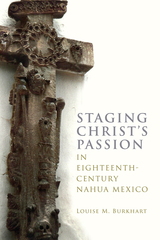
Painted Words presents a facsimile, decipherment, and analysis of a seventeenth-century pictographic catechism from colonial Mexico, preserved as Fonds Mexicain 399 at the Bibliothèque Nationale de France. Works in this genre present the Catholic catechism in pictures that were read sign by sign as aids to memorization and oral performance. They have long been understood as a product of the experimental techniques of early evangelization, but this study shows that they are better understood as indigenous expressions of devotional knowledge.
In addition to inventive pictography to recount the catechism, this manuscript features Nahuatl texts that focus on don Pedro Moteuczoma, son of the Mexica ruler Moteuczoma the Younger, and his home, San Sebastián Atzaqualco. Other glosses identify figures drawn within the manuscript as Nahua and Spanish historical personages, as if the catechism had been repurposed as a dynastic record. The end of the document displays a series of Nahua and Spanish heraldic devices.
These combined pictorial and alphabetic expressions form a spectacular example of how colonial pictographers created innovative text genres, through which they reimagined pre-Columbian writing and early evangelization—and ultimately articulated newly emerging assertions of indigenous identity and memorialized native history.

A cast with over fifty distinct roles acted out events extending from Palm Sunday to Christ’s death on the cross. One actor became a localized embodiment of Jesus through a process of investiture and mimesis that carried aspects of pre-Columbian materialized divinity into the later colonial period. The play told afar richer version of the Passion story than what later colonial Nahuas typically learned from their priests or catechists. And by assimilating Jesus to an Indigenous, or macehualli, identity, the players enacted a protest against colonial rule.
The situation in eighteenth-century New Spain presents both a unique confrontation between Indigenous communities and Enlightenment era religious reformers and a new chapter in an age-old power game between popular practice and religious orthodoxy. By focusing on how Nahuas localized the universalizing narrative of Christ’s Passion, Staging Christ’s Passion in Eighteenth-Century Nahua Mexico offers an unusually in-depth view of religious life under colonial rule.
Burkhart’s accompanying website also makes available transcriptions and translations of the six Nahuatl-language plays, four Spanish-language plays composed in response to the suppression of the Nahuatl practice, and related documentation, providing a valuable resource for anyone interested in consulting the original material.
Comments restricted to single page
plays composed in response to the suppression of the Nahuatl practice, and related documentation,
providing a valuable resource for anyone interested in consulting the original material
READERS
Browse our collection.
PUBLISHERS
See BiblioVault's publisher services.
STUDENT SERVICES
Files for college accessibility offices.
UChicago Accessibility Resources
home | accessibility | search | about | contact us
BiblioVault ® 2001 - 2024
The University of Chicago Press









